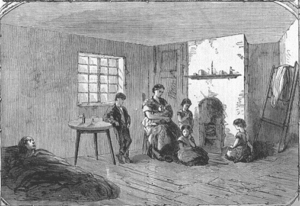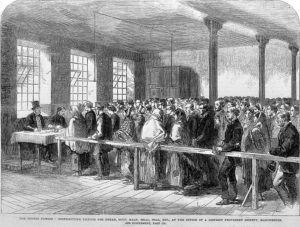
Cotton Operative’s dwelling – ‘Illustrated London News’.
Courtesy of the ‘Cotton Town digitsation project’, and accessed via GeraldMassey.org.uk
During the American Civil War, the supply of cotton to the UK stopped, and the Lancashire mills and factories that relied on it shut down, causing sudden mass unemployment on a scale previously unknown. The cotton industry was the hub of the industrial revolution, and whole families would work in the cotton mills, meaning that the loss of income hit even harder.
In response to the crisis, many former cotton workers wrote poems about their situation, and these were published in regional newspapers. In the 1860s, there were 200 local newspapers in Lancashire reporting on local and national news, and many of these papers also published a daily or weekly poetry column. This ‘Cotton Famine poetry’ has not previously been collected together and interpreted, so the Poetry of the Lancashire Cotton Famine (1861-5) project, funded by the AHRC and led by Dr Simon Rennie, aims to identify these poems, collect them together from their disparate locations in regional archives, and interpret them, making them freely available in a searchable text database developed by Exeter’s Digital Humanities Lab. We are also including audio recordings of the poems, including those in dialect.
Many local libraries hold regional newspaper archives, and the project has also been running programmes to get schoolchildren involved with their local heritage by searching their local archives for cotton famine poems.
At the end of July the project held an event at the Portico Library in the centre of Manchester to announce the ‘soft launch’ of the text database with the first one hundred texts. The event was packed out and over a hundred people attended to hear Dr Simon Rennie, Dr Ruth Mather and folk balladeer Jennifer Reid introduce, discuss and perform the poetry.
Media interest
The last week or so has seen a great deal of interest in our Cotton Famine project. Dr Simon Rennie has been interviewed on BBC Radio Manchester and Radio 4, and gave readings of some of the dialect poetry. The Times and The Guardian published features about the database and about the history of the cotton famine. There is especial interest in the poems written in Lancashire dialect, with poets such as Williffe Cunliam (probably a pseudonym for a William Cunliffe) emerging as previously-overlooked poetic stars, and in the fact that the cotton famine is a relatively unknown episode of history, despite the fact that it affected so many.
The full launch

An 1862 newspaper illustration showing people queueing for food and coal tickets at a district Provident Society office.
Public domain work from Wikipedia.
Between now and the end of the project next year, Simon and Ruth will be adding more poems and expect to populate the database with between 900 and 1,000 by the end of the project. At the same time we will be developing the database to add extra functionality and advanced search capabilities.
Each poem must be found in the archives, and then transcribed by hand, encoded as an XML file according to TEI standards, interpreted with contextual notes, and an audio version recorded. As well as bringing together the poems as a corpus for the first time, the project aims to bring to light previously unknown and undiscovered poems. By the end of the project, the resource will offer an accessible way for both scholars and the public to search and browse all of the cotton famine poems, collected together for the first time.
Hannah Petrie
